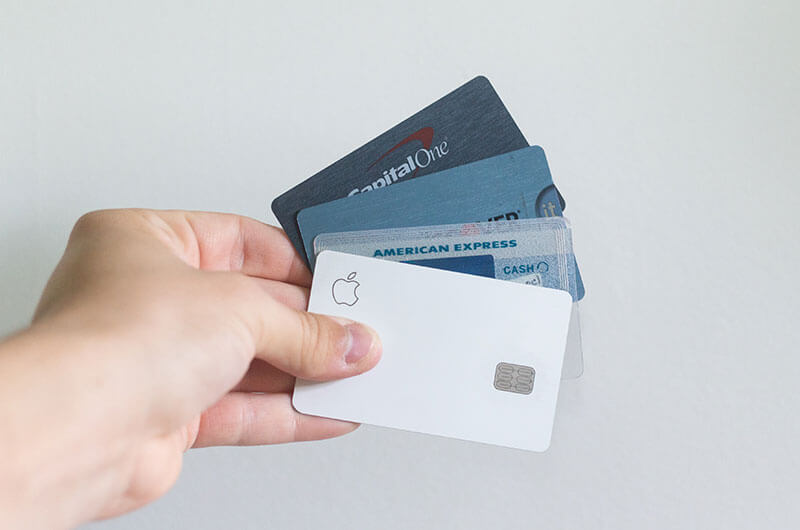Lenders must determine your creditworthiness, or ability to repay your debt, before extending applicants a line of credit. One way lenders do this is by examining your credit score. This is why you need to build credit while studying abroad.
A credit score is a numerical rating that ranges from 300 to 850 and represents your creditworthiness. Creditworthiness, simply put, is how suitable you are to receive credit. Your credit score shows the lender how big of financial risk you are if you were to borrow money.
A credit score can come from various credit bureaus across the globe. FICO score is the most common way to determine credit rating in the United States, while Australia uses Equifax, Illion, and Experian. In Canada, they use Equifax and TransUnion.
A lender checks your credit score when you apply for an international student loan to determine your eligibility. The higher your credit score, the more attractive you are to lenders.
There are five factors that determine your credit score:
- Payment history: This is the most important component of your credit score, accounting for 35% of your score. It looks at whether you can be trusted to repay money loaned to you.
- Amounts owed: This component, accounting for 30% of your credit score, considers your credit utilization ratio. In simple words, it measures how much debt you have compared to your available credit limits.
- Length of credit history: Contributing 15% of your credit score, this component takes into account how long you have been using credit. Having a long credit history that isn’t marred by late payments and other issues is helpful.
- New credit: This component looks at how many new accounts you have applied for recently and how long ago it was when you last opened a new account. If you’ve opened several accounts recently and the percentage of these accounts is high compared to the total number, you could represent a greater credit risk. This factor accounts for 10% of your FICO credit score.
- Types of credit in use: This element considers whether you have a mix of different types of credit, such as credit cards, store accounts, installment loans, and mortgages. Having a mix of credit types is helpful. Since this component only contributes 10% of your score, however, you don’t have to open new accounts just to improve your score.
Unfortunately, most international—including African—students have little or no financial information for lenders to review. As a result, many lenders require international students to have a cosigner who is either a citizen or resident to qualify for loans.
It’s important for African students to begin building their credit history and, as a result, a credit score in the country where they’re studying. Having a credit history and a strong credit score can help you save money on your international student loan’s overall cost. It’s also useful when renting an apartment, buying a car or a house, and, in some situations, landing a job after graduation.
Even if you don’t plan to stay in the country where you’re studying after graduation, it’s not a bad idea to build credit and keep your options open. The sooner you start building your credit as an international student, the better. Fortunately, there are various ways to help you accomplish this goal.
Below, we have compiled a step-by-step guide to help international students build credit while studying abroad.
Step 1- Get a Social Security Number/Individual Taxpayer Identification Number
If you’re in the US, you need to have a US Social Security Number (SSN) or an Individual Taxpayer Identification Number (ITIN) to start building credit. A social security number is a nine-digit identifier issued to citizens, permanent residents, and eligible nonimmigrant workers in the United States.
A Social Security Number is used to report wages to the government, track social security benefits, and for other identification purposes. For international students to be granted employment authorization, they need to have an SSN.
If an international student isn’t eligible for an SSN but receives non-wage income while in the United States—such as scholarships, grants, lottery winning, or interest on stocks—they must have an Individual Taxpayer Identification Number (ITIN).
How to Apply for a Social Security Number
Applying for a U.S Social Security Number can be a long process—make sure to start applying as early as possible. Follow the steps below to get an SSN while studying in the United States:
- Consult your designated school official (DSO) about working and building credit in the US. They will share with you the information on the regulations and requirements for your visa type and confirm whether you’re eligible for an SSN.
- Verify that you’re in “Active” status in the Student and Exchange Visitor Information System (SEVIS). Your SEVIS record has to be Active for at least two days before the SSN application. If your record shows a different status, your application for an SSN won’t be successful.
- Wait for 10 days after arrival in the United States before applying for a Social Security Number. This gives adequate time for your arrival information to be updated in all the government systems. You can use the SAVE Case Check to follow the progress of your SAVE (Systematic Alien Verification for Entitlements) verification online.
- Visit your local SSA office and file your application for a social security number. Ensure that you have all the necessary documents to prove your age, identity, and work-authorized immigration status. Your immigration status, work authorization, and other documents must not be expired.
How to Apply for an Individual Taxpayer Identification Number
To apply for an Individual Taxpayer Identification Number as an international student, submit a Form W-7, “Application for IRS Individual Taxpayer Identification Number,” with a U.S. tax return.
Other required documents include:
- A certification letter (with applicant’s full name and SEVIS number)
- Copies of identity and foreign status documentation A copy of the Form I-20,
- “Certificate of Eligibility for Nonimmigrant Student Status”
- Other required documentation to meet the Form W-7 application requirement
An international student with an F or M visa who is ineligible for a Social Security Number must apply for an ITIN if they receive:
- A grant, fellowship, or scholarship
- Interest from stock options, lottery, or gambling winnings
- Other types of non-wage income
Step 2- Get a Credit Card
A credit card is crucial in building credit as an African student abroad. When you use a credit card responsibly, it helps you build and improve your credit score, proving your creditworthiness to lenders. The use of credit cards has become very common over recent years, which makes it almost obligatory to own a credit card when studying abroad.
Once you have a credit card, you can use it to pay for daily purchases. Make sure to promptly pay off your charges each month or week, which will improve your credit score over time. Missing payments can harm your credit score. If possible, set up automatic payments for the minimum due each month. You can pay the difference of what you’ve spent on the card manually.
Compare different credit cards and go for one that has high reward rates in the categories you spend in and doesn’t charge foreign transaction fees. If you don’t have a Social Security Number, look for a credit card that accepts Individual Taxpayer Identification Numbers (ITIN).
What You Need to Apply for a Credit Card
Getting your first credit card as an international student can be tough. You’ll be expected to provide:
- A permanent address—you can use your school address for this
- A Social Security Number or Individual Taxpayer Identification Numbers (ITIN)
- A bank account that you’ll use to settle the credit card payments (more on that below)
- Proof of employment (even if it’s a part-time on-campus job) to show that you have the income necessary to pay back the money you borrow on your credit card.
Expert tip: Don’t apply for too many cards at once—receiving too many rejections can negatively affect your chances of other issuers accepting your application. It’s advisable to submit only one or two applications, especially for cards designed for students with lower credit lines.
How to Build Credit with Credit Card Alternatives
If you’re unable to get a traditional credit card, there are some other alternatives you can explore to start building your credit score. Let’s explore some of them below:
Go for Secured Credit Cards
You may be able to get a secured credit card, which requires you to put down a deposit. Just like a traditional credit card, a secured credit card will enable you to build your credit history and credit score.
Become a Credit Card Authorized User
Do you have a trusted family member or friend that can add you as an authorized user on their credit card?
You will receive a credit card in your name but it will be charged to the account owner. Some issuers may report the payment history of the card for both the cardholder and the authorized user—allowing you to build your credit score. Arrange with the holder on how to use the card and make payments on time.
Explore Alternative Credit Cards
There are startup companies that offer alternative credit cards that don’t require you to put down a security deposit. They also don’t rely on the traditional FICO-based method of credit evaluation—instead, they use their own proprietary underwriting models to determine an applicant’s creditworthiness (taking into account factors such as your school, future career prospects, your employer, and bank information).
Some of these companies specifically target international students. For instance, Deserve EDU Mastercard for Students doesn’t require international students to have either a Social Security Number or U.S credit history.
Use Store Credit Cards
Some stores provide their customers with credit cards to use specifically for purchasing goods from them. Often, they offer rewards such as discounts and early notification on sales and promotions.
Store credit cards are easier to get approval for and will help you to start building credit as an international student. However, they typically have lower credit limits than traditional credit cards. If you make minor purchases and don’t have a high credit limit, your borrowed to available credit ratio could hurt your credit score. Just like with any other credit card, make your payments on time to avoid penalties.
Step 3- Open a Bank Account in the Country of Study
As we’ve noted, you need to have a bank account through which to settle your credit card payments. However, you can also start building credit directly through a bank using either a debit or savings account.
Check if the bank you use in your home country has a branch in the country of study. Many international banks offer special accounts for customers moving abroad. If that option isn’t available for you, there are plenty of others to explore—your university might even have a bank on campus.
Here is how to build your credit score using a bank account:
- Open both a checking and a saving account. Regularly transfer money into the savings account (or keep the savings account healthy) to show that you’re financially responsible.
- Set up direct debits from your account to ensure that your bills and expenses are always paid on time. Being able to pay your bills on time also indicates financial responsibility and keeps your credit score high.
Expert tip: Go for a bank that has a mobile app—which makes it easier to transact and access your account information, whether you’re just across town or across the world on vacation.
Step 4- Pay Your Utility Bills on Time
Are you renting a property (either by yourself or with housemates)? That means you will have to pay utility bills—gas, electricity, internet, phone, etc. While paying bills is no fun, it also helps in building credit as an international student.
As we’ve mentioned, you should set up monthly transfers from your account to make sure that your utility bills are paid on time. You can also make automatic utility payments from your credit cards. However, this might come with additional charges.
Making regular payments on utilities shows lenders that you’re financially responsible. Many lenders may ask you to bring proof of utility payments as supporting evidence when applying for a loan.
Step 5- Monitor Your Credit Score
Now that you’ve started building credit, it’s also advisable to monitor your credit score. There are various services that allow you to create a profile of your credit score—through which you can not only monitor the development of your credit score but also help in preventing identity theft and credit fraud.
Essentially, credit monitoring services give you an extra layer of protection for your financial profile. Mitigating credit card issues ultimately creates a stronger credit score as it shows lenders that you’re a low-risk candidate.
You can find free credit monitoring services online. However, it’s better to go for more comprehensive paid services—especially when applying for a loan.
Expert tip: Even if you don’t need to apply for a loan, make sure to check your credit score at least once a year.
Frequently Asked Questions About Building Credit Score Abroad
How long does it take to build a credit score?
It takes at least 2 to 6 months to generate a credit score when you’re building your credit from scratch. However, building a good credit score takes years.
What is considered a good credit score?
What is considered a good credit score varies depending on the rating model. However, a score of 580 to 669 is generally considered fair, 670 to 739 is considered good, 740 to 779 is considered very good, and 800 and up is considered excellent.
What is considered a low credit score?
A low credit score is generally below 600, although ranges vary depending on the model. FICO considers a credit score to be poor if it falls below 580.
What are some ways to build credit while studying abroad?
The best ways to build credit while studying abroad include:
- Getting a credit card
- Opening a bank account
- Making your payments on time
How can I improve my credit score?
You can improve your credit score over time as you build your credit history. Make sure to make payments on time and have a healthy savings account to show financial responsibility and creditworthiness.




